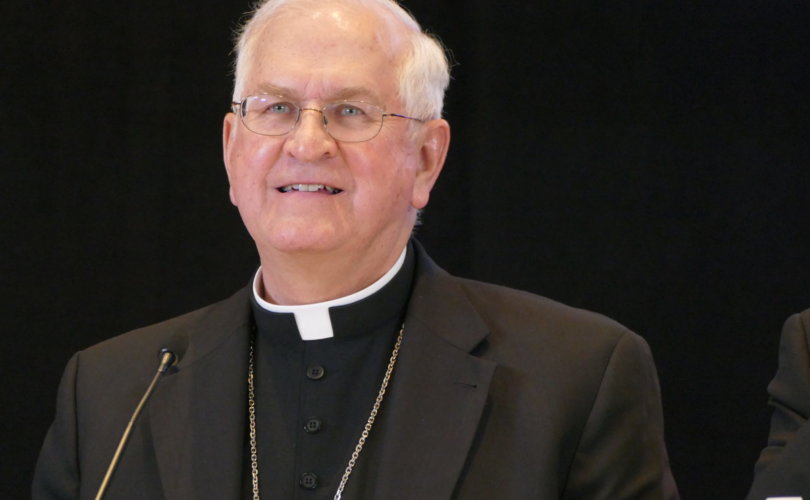BALTIMORE, Maryland, November 14, 2016 (LifeSiteNews) – Although Pope Francis has said “very clearly” he has no desire to “make any canonical changes or any new doctrine” related to Amoris Laetitia, “we do need to school ourselves a little more in the rightful use of the internal forum,” outgoing U.S. Bishops' Conference president Archbishop Joseph Kurtz said on Monday.
“The first thing is, let’s not get ahead of things,” Kurtz said in response to a question from LifeSiteNews about whether the USCCB's implementation of Amoris Laetitia will continue what Pope St. John Paul II taught in Familiaris Consortio. “We are in the process of receiving an apostolic exhortation and we’re very grateful for that. It pains me a little bit that I worry that people haven’t done what our Holy Father said [which] is read first chapter[s] four and five. That we haven’t unpacked it. He himself has said very clearly, ‘please read with patience and with care. Don’t rush through this.’ So I’m gonna heed his advice.”
In Familiaris Consortio, Pope St. John Paul II wrote that unless a divorced and “remarried” couple live abstinently, they may not be admitted to Holy Communion because it would be sacreligious and could scandalize the faithful. The “internal forum” refers to a case-by-case approach to the question, usually undertaken by a priest and the couple.
There have been a variety of responses to Amoris Laetitia, with progressive prelates like Cardinal Walter Kasper saying it has changed the Church's sacramental practice to allow Communion for those who are “remarried” and have not had their previous unions declared null by the Church, and with some bishops, including Americans, saying the Church's sacramental practice remains in place.
In a letter the Vatican confirmed as authentic, Pope Francis wrote to Argentinian bishops expressing his support for their guidelines on the exhortation, which allowed Holy Communion for the divorced and remarried in some circumstances.
Today, four cardinals released a letter they wrote to Pope Francis asking for clarification on Amoris Laetitia. After the pontiff refused to respond, the cardinals went public with their concerns.
The USCCB, at the request of the Vatican, studied how the exhortation is being implemented across the country. Its study recommended the USCCB develop resources on “best practices based on Amoris Laetitia,” particularly “further resources on the application [of] aspects … such as those treating the internal forum and reception of the sacraments with regard to persons in irregular marital situations” and “advice on how confessors can assist persons in irregular marital relationships.”
On Tuesday, the U.S. bishops will elect a new president, who will serve a three-year term. The meeting today touched on a variety of issues related to immigration, healing a nation divided after the presidential election, religious liberty, race relations, pro-life issues, and the latest Lepanto Institute report on the activities of Catholic Relief Services.
Below is the full transcript of Kurtz's exchange with LifeSiteNews:
LifeSiteNews: In October, the USCCB released the results of a survey of the country's bishops on Amoris Laetitia. It recommended the development of resources on 'best practices on Amoris Laetitia,' particularly 'further resources on the application [of] aspects … such as those treating the internal forum and reception of the sacraments with regard to persons in irregular marital situations' and 'advice on how confessors can assist persons in irregular marital relationships.'
My question is, will USCCB guidelines continue Pope St. John Paul II's teaching in Familiaris Consortio that there are no circumstances in which the divorced and remarried who do not intend to live as brother and sister may be admitted to Holy Communion?
Archbishop Kurtz: Well, Claire, thank you, first of all, maybe I can say a word about that and perhaps others on the panel will say something. The first thing is, let’s not get ahead of things. We are in the process of receiving an apostolic exhortation and we’re very grateful for that. It pains me a little bit that I worry that people haven’t done what our Holy Father said [which] is read first chapter[s] four and five. That we haven’t unpacked it. He himself has said very clearly, ‘please read with patience and with care. Don’t rush through this.’ So I’m gonna heed his advice.
On October 6, I had the opportunity to meet with Pope Francis and talked about the reception and the fact that in addition to I think, um, so very positive receptions, including what’s happening in the Archdiocese of Louisville. I also mentioned that our bishops in their survey asked for resources. No what’s going to happen within our conference is anytime there’s a request for resources, that will normally go to our priority planning committee that would be then be asking probably Laity, Marriage and Family, and Youth to begin to help respond to those resources.
So we’re a little ahead of the game in the very specific questions you answered, I think our first thing to look at is our Holy Father has said in his document—apostolic exhortation—very clearly that there is no desire on his part to make any canonical changes or any new doctrine. And so, I think we do need to school ourselves a little more in the rightful use of the internal forum. Thank you.

